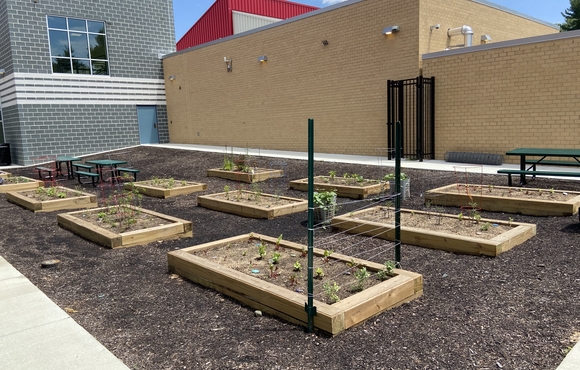The Howard County Local Health Improvement Coalition (LHIC) has provided $4,150 to the Community Ecology Institute to build and maintain community gardens at Bryant Woods and Talbott Springs elementary schools. These gardens, which are already flourishing, will allow the schools to pilot the implementation of interactive nutrition education activities for all grade levels starting in the fall of 2023. Photos of the gardens can be found by accessing Dropbox here.
The nutrition education activities will be overseen by the University of Maryland Extension SNAP-Ed program. The funds for this project were provided to the LHIC, which is part of the Howard County Health Department, through a grant from CareFirst BlueCross/BlueShield as part of their National Health Equity Strategy to address the Diabetes epidemic.
According to the 2021 Community Health Indicators Report Card, 1 in 2 persons in Howard County is either overweight or obese and 1 in 5 were told their child should lose weight by a healthcare professional. A long-term benefit of maintaining a healthy weight is the decreased healthcare burden due to chronic diseases, like diabetes, that affect 11% of the Howard County adult population, with significant racial disparities.
“Community gardens offer access to low or no cost fruits and vegetables to residents in communities where healthy foods may be harder to afford or find,” said Dr. Maura Rossman, Howard County Health Officer. “Providing children hands-on experiences around gardening and nutrition not only gets them outside and interacting with classmates, but also teaches them healthy eating habits that can have long-term benefits.”
“As we’ve seen throughout our incredible county, community gardens help us increase the availability of nutritious foods, strengthen our community ties, enhance our environment, reduce our food miles and make families more self-sufficient,” said Howard County Executive Calvin Ball. “Bringing these gardens to our schools will provide our youngest students with these wonderful benefits, and serve as an outdoor classroom where they can get their hands in the dirt to learn more about plant science, biology, chemistry, and more.”
"The community gardens located at two of our elementary schools are a wonderful example of collaboration between multiple entities to serve the needs of our neighbors and provide an enriching experience for students," said Dr. Michael J. Martirano, Superintendent of Schools. "Students will have an opportunity to learn agricultural skills, experience the healthy benefits of growing your own food, and be able to serve the members of their community. I appreciate the efforts of all involved to make this experience a reality."
“Promoting nutrition education and expanding access to healthy foods are important priorities for our County,” said Anthony C. Wisniewski, Esq., Howard County Board of Health Chair. “The Board of Health supports the activities of our LHIC to achieve health equity in Howard County.”
“The Community Ecology Institute's Nourishing Gardens program seeks to bring the benefits of our Freetown Farm location to where people live, learn, work and play throughout Howard County,” said Chiara D’Amore, Ph.D, CEI Executive Director. “We install edible and ecologically beneficial gardens, with an emphasis on creating access to food and gardening knowledge for individuals and communities that face food insecurity. In the past year we have installed over 30 gardens in community spaces, with an emphasis on Title 1 schools. It is our goal to have a garden in every school - making school grounds learning grounds. By partnering with LHIC on Nourishing Garden installations, we are able to achieve shared goals around ensuring that everyone in Howard County has access to fresh, nutritious food."
“The University of Maryland SNAP-Ed Program in Howard County utilizes gardening as a tool to foster positive feeding behaviors,” said Razan Sahuri, Nutrition Educator with the University of Maryland SNAP-Ed Program in Howard County. “Aside from the boundless benefits gardens offer to procure fruits and vegetables, it provides hands-on experience handling food, increasing exposure to new foods, and growing confidence in tasting and preparing foods for themselves and their families. On-site gardens engage both participants and collaborators in the growth and maintenance thus helping to create a culture around healthy food access at a site.
The curriculum and activities from the pilot will be made available to other schools as a resource for the implementation of similar garden education programs. The goals of school engagement with gardening are to help increase fruit/vegetable consumption, encourage physical activity and decrease social isolation.
For more about the Howard County Local Health Improvement Coalition and information about how members of the public can get involved, visit www.hchlhic.org. Food and nutrition information and resources are available by visiting the LHIC Healthy Eating webpage.
